My background is in chemistry, and until graduation, I never formally studied biology. However, I’ve always been passionate about wildlife and nature, thanks to my childhood spent along the banks of the Ganga River, surrounded by its rich biodiversity and interactions. Growing up, I didn’t have binoculars or books, and I only knew a few birds by their local names. In Bihar, there was a strong emphasis on pursuing medical, engineering, or government jobs, and that was all I knew. After completing my graduation, I enrolled in a forestry course at the Forest Research Institute (FRI). The beauty of the FRI campus and its diverse birdlife captivated me, and I began exploring birds more earnestly, finding great enjoyment in this field. Initially, learning the common names of birds took some time, but with the help of supportive seniors and teachers, I started to understand bird ecology and grew to love it. I never forgot to carry Grimmett’s bird guidebook, which sparked my curiosity and helped me identify many birds. During my M.Sc., I often went bird watching – alone, with friends, or sometimes by requesting guidance from well-known birders. Even today, when I visit the hills, the calls of the Great Barbet and Hill Partridge give me a unique sense of belonging, making me feel like this is my true home. My journey till now has deepened my appreciation and love for birds and their habitats, driving my desire to learn more and contribute to their conservation.
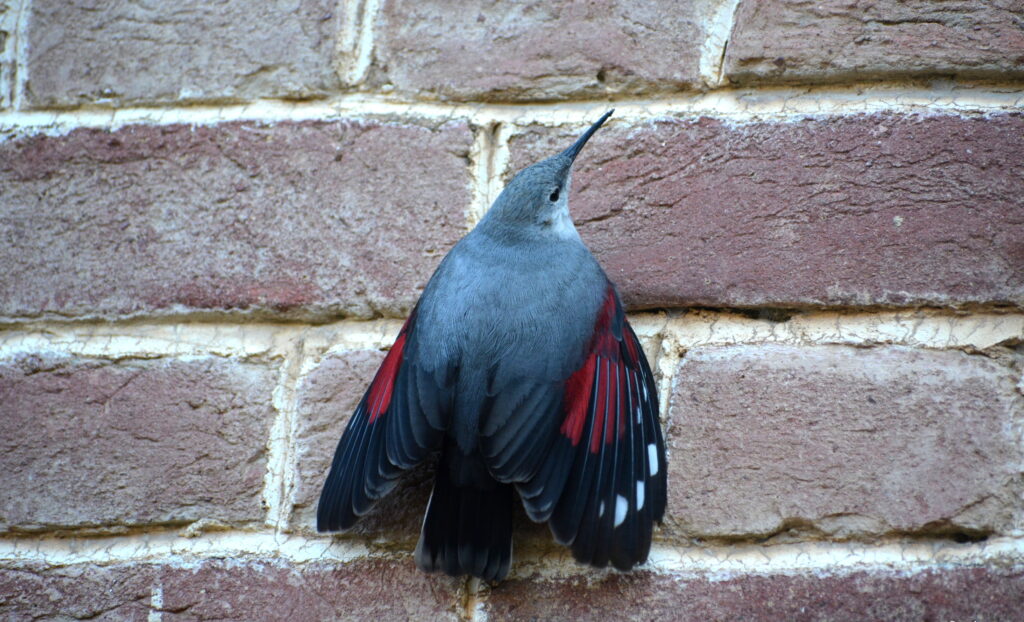 A Wallcreeper, a winter migrant bird in Dehradun, deftly scaling the walls of the Forest Research Institute in Dehradun
A Wallcreeper, a winter migrant bird in Dehradun, deftly scaling the walls of the Forest Research Institute in Dehradun
This is how my interest in birds and nature took shape…
My interest in birds and nature began during my childhood spent near the Ganges River and its surrounding wetlands. These riparian landscapes were my playground, where I spent time playing, swimming, fish-catching, and boating. My early experiences in nature made me aware of the environment. In winters, I observed numerous migratory birds arriving at the Ganges riverbank without binoculars or books and scientific knowledge; yet I found immense joy in watching them. However, my happiness was tempered by witnessing local individuals in Bihar harming these birds, specifically a lark species known locally as ‘Bageri,’ which is hunted for food and sold for consumption. Despite its hunting, it persists as a socio-economic necessity for some. These early experiences deeply affected me, particularly seeing the hunting of various bird species, including water birds, larks, doves, pigeons, and hornbills.
Although my family had expectations for me to pursue engineering, I earned a degree in Chemistry Honours from Patna Science College. Following my undergraduate studies, I was drawn to forestry and pursued a Master’s degree at the Forest Research Institute (FRI) in Dehradun. During my M.Sc., I frequently went birdwatching – sometimes alone, with friends, or guided by well-known birders. At FRI, I had the privilege of learning from mentors like Dr. Dhananjai Mohan, Dr. Anil Kumar, Dr. Amit Kumar , Dr. Monica Kaushik,& Dr. Hukum Singh. whose expertise and passion inspired me to pursue a career in ornithology. Conducting extensive bird surveys in the Himalayan region under their guidance solidified my determination to further my knowledge in this field. Thus, my journey into ornithology has been shaped by a combination of early childhood experiences and the mentorship of dedicated experts, driving my passion for birds and nature.
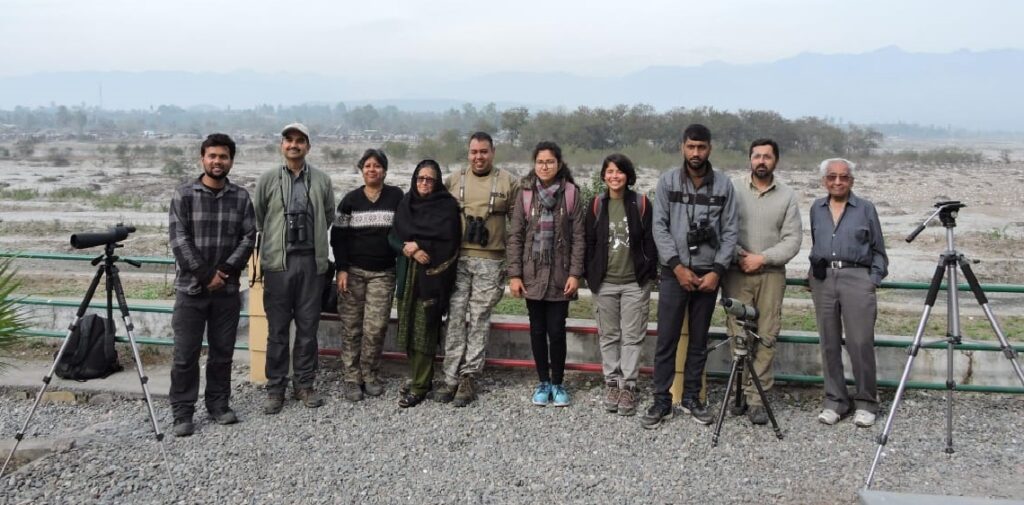 Uttarakhand Water Bird Census at Asan Wetland, alongside my co-guide Dr. Dhananjai Mohan, IFS, and other esteemed birders.
Uttarakhand Water Bird Census at Asan Wetland, alongside my co-guide Dr. Dhananjai Mohan, IFS, and other esteemed birders.
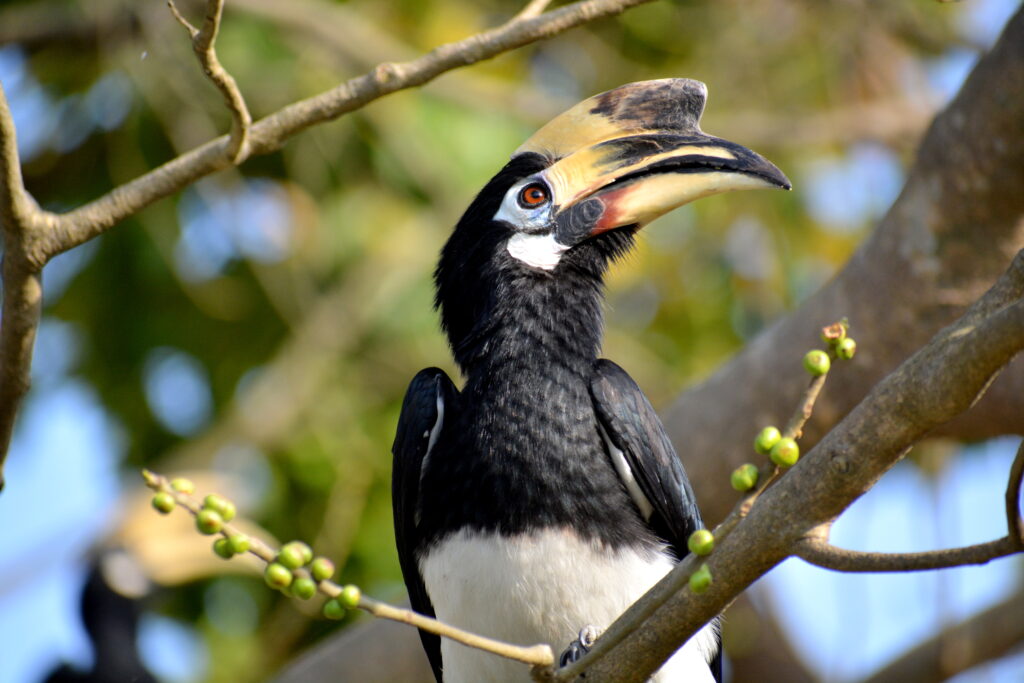 An Oriental Pied Hornbill perched near on a fig tree tree in the Rajaji Tiger Reserve
An Oriental Pied Hornbill perched near on a fig tree tree in the Rajaji Tiger Reserve
This is when my interest in ornithology took a research direction. Platforms like eBird and activities organized by the forest department and NGOs such as Doon Nature Walk & Nature Science Initiative provided excellent opportunities for me to connect with people and learn more. My excitement in spotting new species and discovering them in the wild sparked questions about why certain birds thrive in specific environments and how these habitats sustain them.
My M.Sc. dissertation focused on habitat ecology, examining how managed and natural forests have affected biodiversity and its structure over a decade in the FRI Campus. This research involved comparing bird community structures with a study conducted 10 years earlier by Dr. Dhananjai Mohan. I conducted extensive bird surveys in the Himalayan region, discovering numerous bird species and their diverse habitats. These surveys broadened my understanding of avian diversity and revealed the nuanced ecological relationships between birds and their habitats.
It was during these field expeditions that I became particularly fascinated by plant-bird interactions, especially involving frugivorous birds in the Himalayas. The role of birds as frugivores and seed dispersers in shaping forest ecosystems captured my imagination. Witnessing firsthand the importance of avian species in maintaining biodiversity and ecosystem resilience solidified my resolve to pursue a Ph.D. focusing on plant-frugivore interactions in the Shivalik Hills. With the invaluable support of mentors like Dr. Rohit Naniwadekar, Dr. Navendu Page, Dr. Amit Kumar, and Dr. Dhananjai Mohan, I embarked on this research journey. Their guidance, particularly from Dr. Naniwadekar, coupled with my passion for conservation biology, provided the framework for my research. Through rigorous fieldwork, data collection, and analysis, I aim to contribute to our understanding of the ecological dynamics between plants and frugivorous birds.
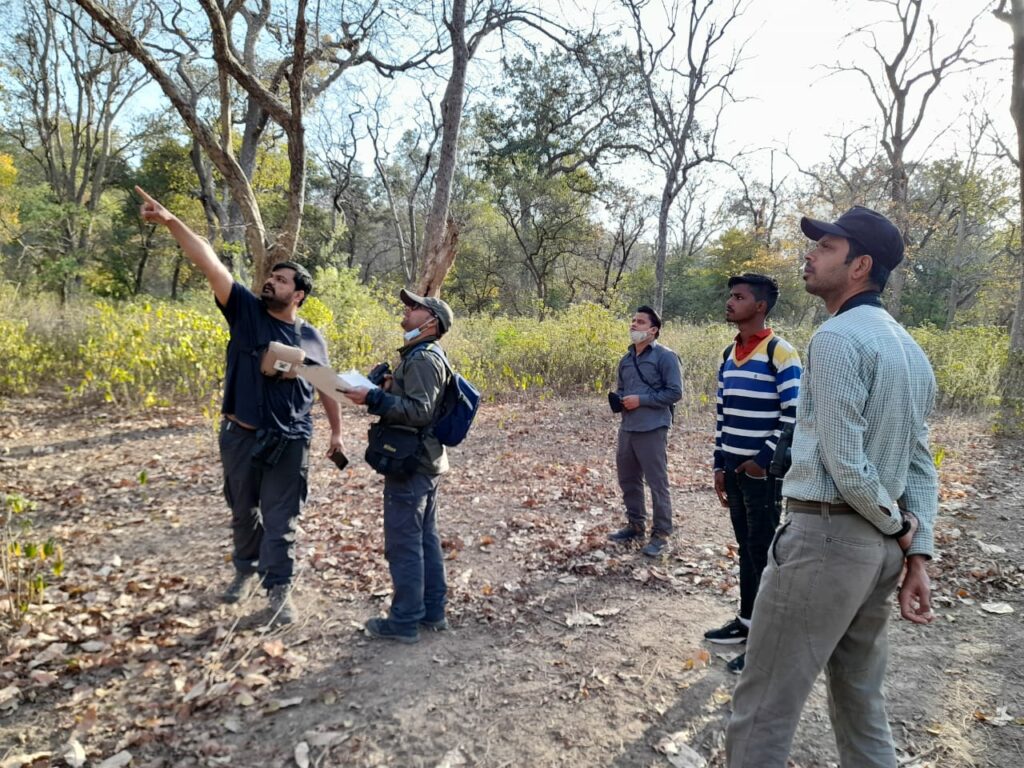 My Ph.D. co-guides, Dr. Rohit Naniwadekar and Dr. Navendu Page, guiding and training me in the precise and methodical process of bird data collection.
My Ph.D. co-guides, Dr. Rohit Naniwadekar and Dr. Navendu Page, guiding and training me in the precise and methodical process of bird data collection.
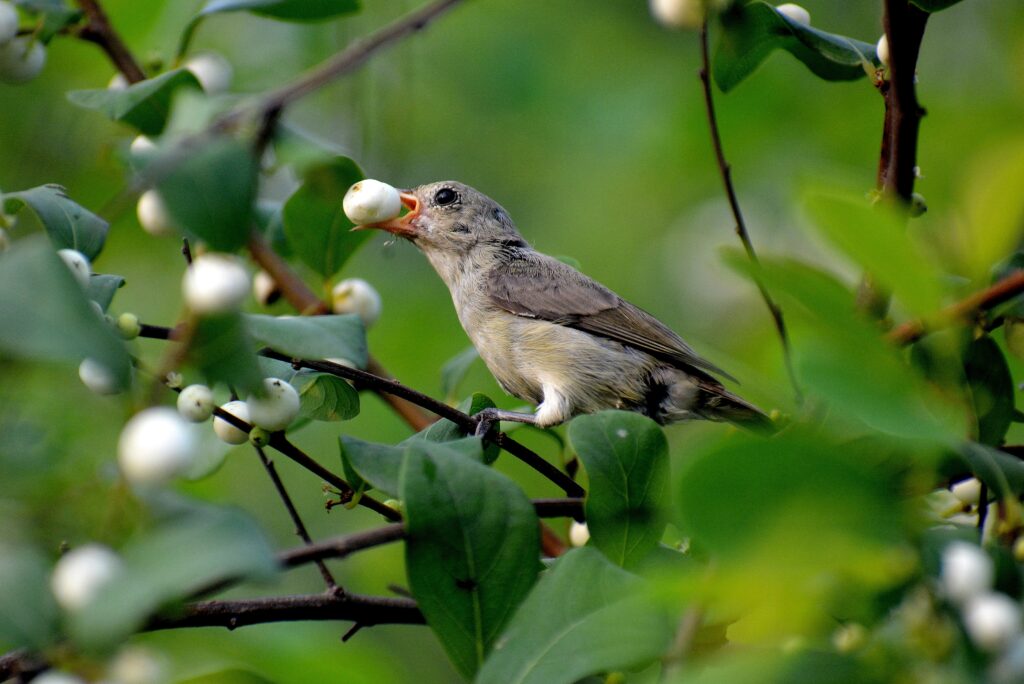 A Pale-billed Flowerpecker feeding on the fruit of a snowberry, on the Wildlife Institute of India campus
A Pale-billed Flowerpecker feeding on the fruit of a snowberry, on the Wildlife Institute of India campus
Currently, my research focuses on understanding the impacts of habitat degradation and invasive species on plant-frugivore communities in the Shivalik Hills of Uttarakhand. One key aspect of my work involves investigating the effects of habitat degradation on resource availability for frugivores and its cascading impacts on plant-frugivore communities. Degradation of habitats often leads to a reduction in the availability of fruits and other resources which are crucial for frugivorous birds and mammals, and can have far-reaching consequences for seed dispersal and plant regeneration. I am also studying the ecological impacts of the invasive species Lantana camara on native plant-frugivore communities. The invasion of Lantana can lead to a decline in native plant species diversity and disrupt the ecological relationships between plants and their frugivores. My research seeks to determine how the presence of Lantana affects fruit availability for native frugivores and how these changes influence seed dispersal patterns and plant community dynamics. Through comprehensive field studies, including vegetation surveys, frugivore observations, and seed dispersal experiments combined with rigorous data analysis, I aim to contribute to our understanding of these complex ecological dynamics. Understanding the relationships between habitat quality, invasive species, and plant-frugivore interactions is crucial for developing effective conservation and management plans for the Himalayan Forest ecosystem.
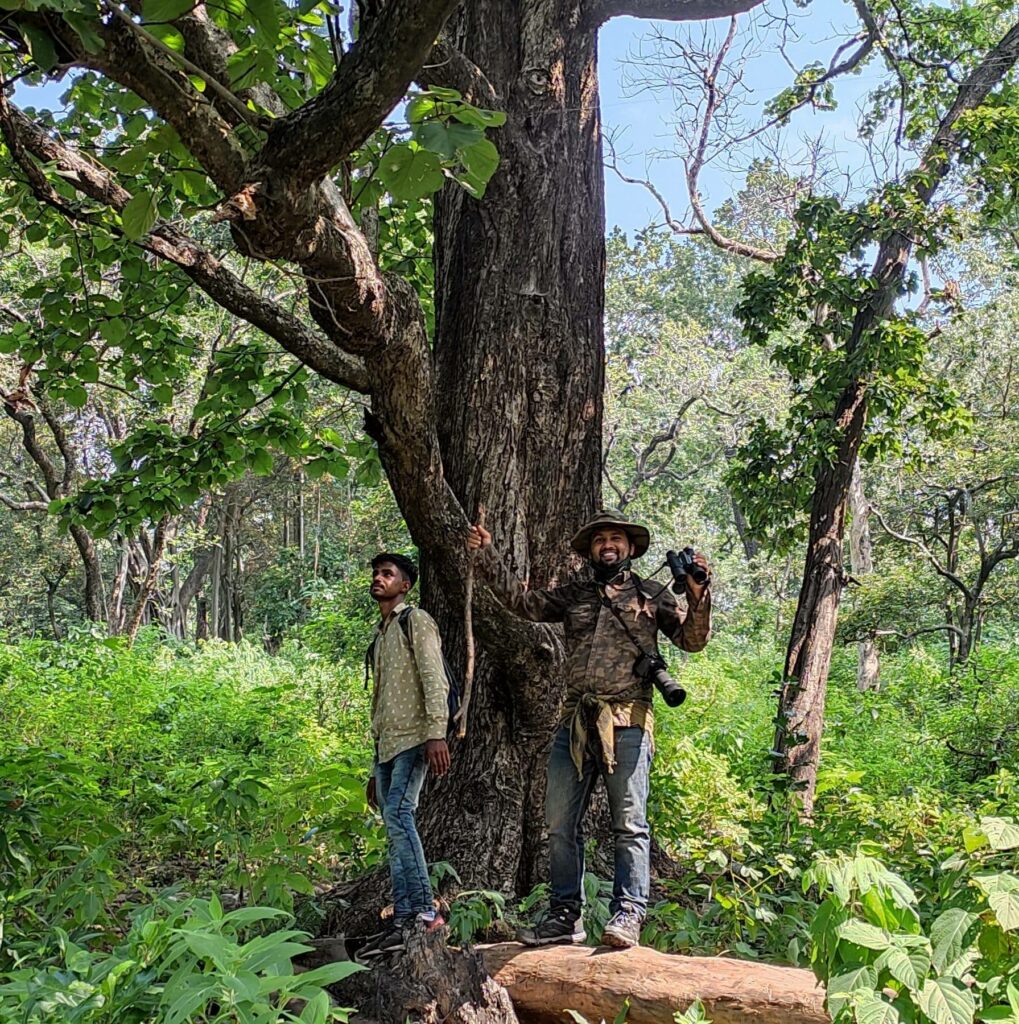 My field assistant and I just before sampling for birds in the Rajaji Tiger Reserve
My field assistant and I just before sampling for birds in the Rajaji Tiger Reserve
I love what I do because..
One aspect of my work that I find particularly fulfilling is exploring the detailed ecological relationships between plants and birds. Investigating how habitat degradation and invasive species impact these interactions allows me to uncover the complexities of ecosystem functioning and biodiversity conservation. I am particularly drawn to the fieldwork involved in my research, which enables me to immerse myself in diverse landscapes and observe the interactions between plants and birds first hand. Whether conducting bird surveys in the Himalayan region or monitoring plant phenology in disturbed and undisturbed landscapes, each field expedition offers new insights into the natural world.
I also share this knowledge with citizen scientists and local communities, emphasizing the importance of their connection with nature for the betterment of the future. Furthermore, I am passionate about the potential implications of my research for conservation and management strategies. By identifying key factors shaping plant-bird communities and understanding how they respond to environmental changes, I hope to contribute to the preservation of biodiversity and the sustainable management of natural resources. Overall, the opportunity to blend scientific inquiry with practical conservation applications is what I find most rewarding about my work. It allows me to make meaningful contributions to our understanding of ecosystems and to work towards ensuring their long-term sustainability.
Challenges I faced..
Challenges are an integral part of any work, and overcoming them strengthens one’s passion and prepares one for future obstacles. In my research, I have encountered several challenges, particularly regarding funding. Genuine researchers and field assistants often struggle to secure adequate support, especially in countries like India, despite their hard work in data collection. Although institutes receive funding for research, it is often not effectively channeled into actual research activities. Balancing multiple responsibilities, such as data gathering, analysis, report writing, and official project work while pursuing my Ph.D., has been time-consuming and exhausting, often with outcomes not aligning with expectations. Maintaining high morale and motivation has also been challenging, as I frequently question the impact of my work on conservation. The support of my family has been crucial since I began my Ph.D. These experiences have taught me resilience and the importance of perseverance in the face of adversity.
My advice to young researchers is..
- Develop a Strong Foundation and Stay Versatile: Embark on ornithology with passion, resilience, and a readiness to face challenges. Master diverse skills like fundraising, logistics, data collection, analysis, and publication. Set realistic goals and persist through setbacks to achieve rewarding discoveries.
- Embrace Curiosity, Citizen Science, and Interdisciplinary Approaches: Make curiosity and citizen science central to your work. Cultivate a deep interest in bird behaviour and contribute to ongoing research. Integrate ecology with social sciences to enhance research impact in biodiverse regions.
- Build a Network, Seek Mentorship, and Engage in Educational Outreach: Connect with researchers, attend conferences, and find mentors who are knowledgeable and humble. Share knowledge and foster conservation awareness within communities, empowering individuals to contribute to conservation efforts.
- Prioritize Meaningful Contributions Over Financial Gain and Stay Motivated: Focus on benefiting society and the environment by sharing findings to support future conservation efforts. Recognize that every small step contributes to larger goals. Stay motivated by remembering your passion for birds and the potential impact of your work.
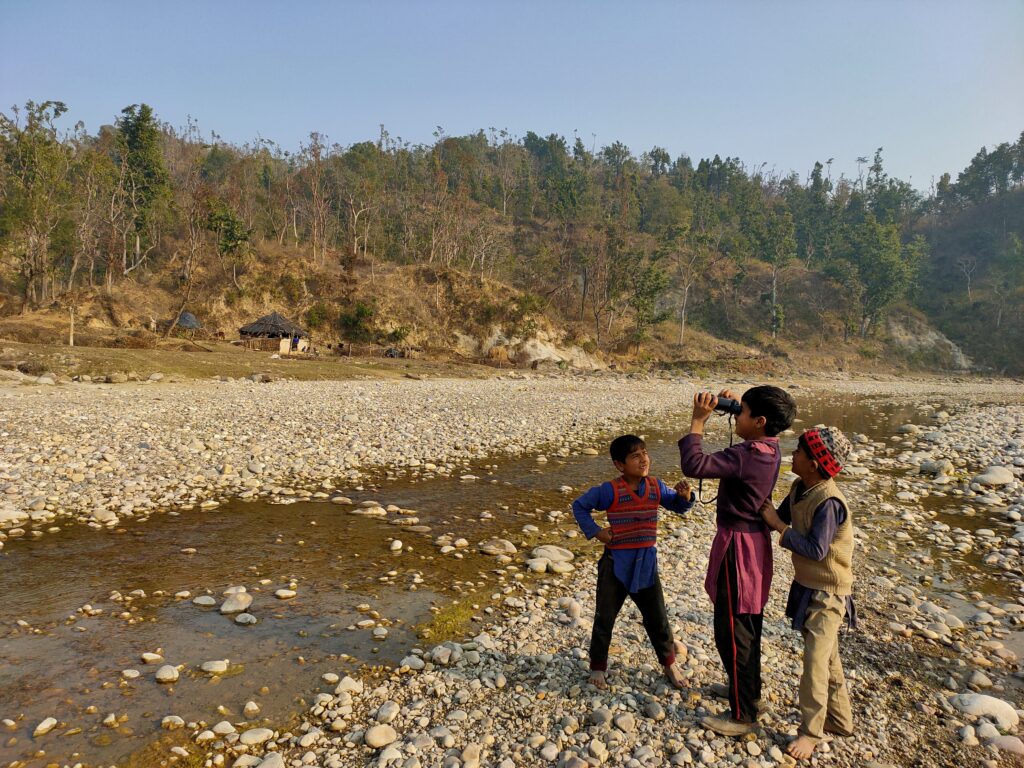 A moment after completing data collection in the Shivalik Forest Division, where I had the opportunity to interact with Van Gujjar children. They are seen enjoying my binoculars, eager to learn and explore, reflecting their innate curiosity and connection to the natural world.
A moment after completing data collection in the Shivalik Forest Division, where I had the opportunity to interact with Van Gujjar children. They are seen enjoying my binoculars, eager to learn and explore, reflecting their innate curiosity and connection to the natural world.
Sipu Kumar
sipuwildlife@gmail.com / sipukumar@wii.gov.in
PhD Scholar & Senior Project Associate
Wildlife Institute of India
Research Gate Profile
Orcid id

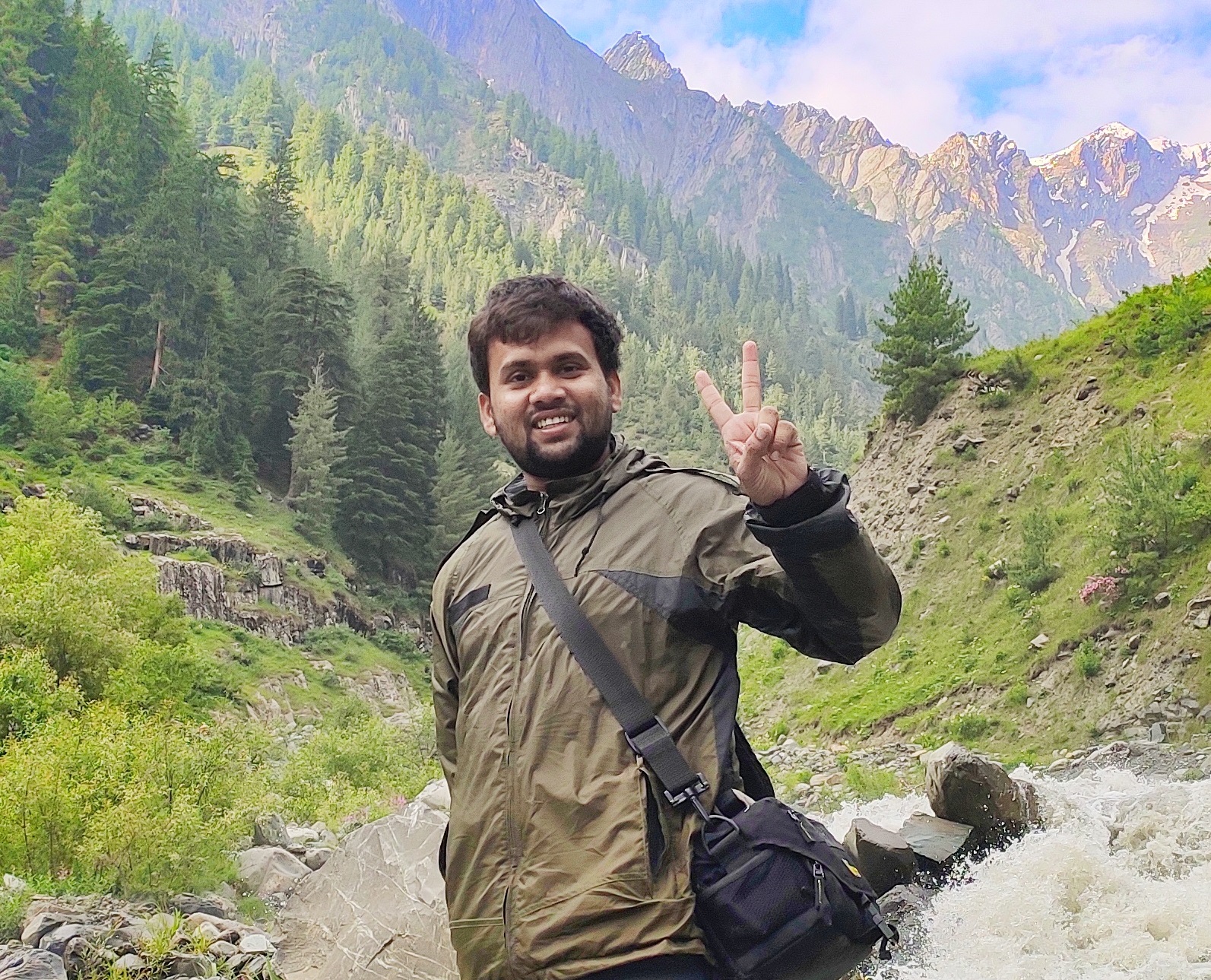
Such an inspirational article for the avian as well as nature lovers.We all are greatly inspired by your works ..keep doing the great job
Your journey will inspire people in embracing their true self and give courage to people in their journey to self realisation. We pray to God that you always succeed in your inspiring journey. Keep it up🌟